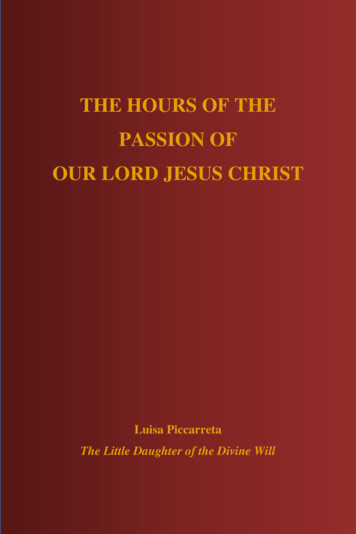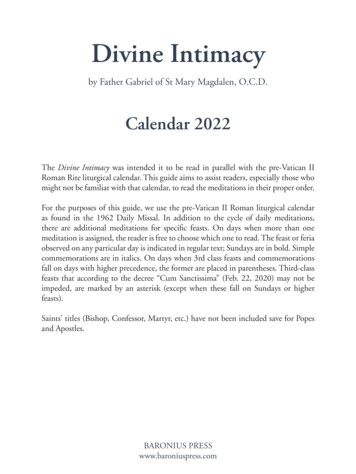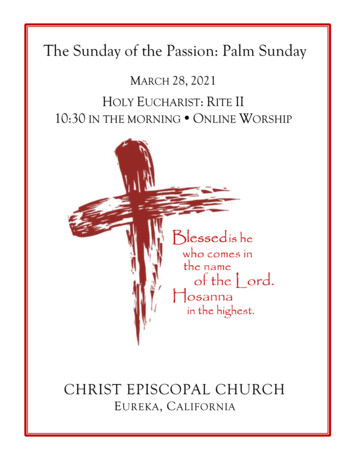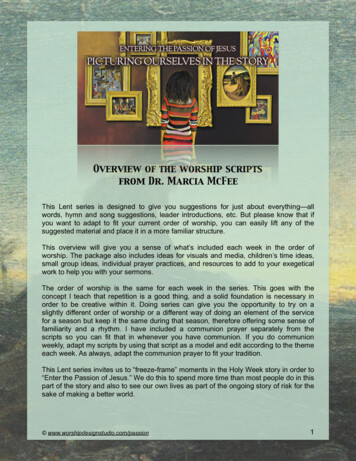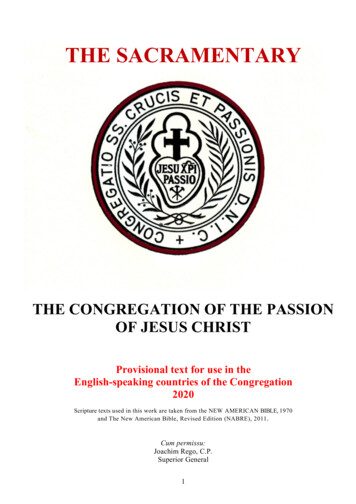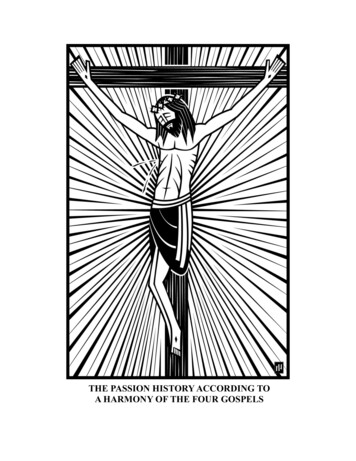
Transcription
THE PASSION HISTORY ACCORDING TOA HARMONY OF THE FOUR GOSPELS
in remembrance of me.” In the same way, after thesupper he took the cup, gave thanks and offered it tothem, saying, “This cup is the new covenant in myblood, which is poured out for you and for many for theforgiveness of sins.” They all drank from it.1. The Passover and the Lord’s SupperIn the evening Jesus and his apostles reclined at thetable. And he said to them, “I have eagerly desired toeat this Passover with you before I suffer. For I tell you,I will not eat it again until it finds fulfillment in thekingdom of God. Jesus took the cup, gave thanks, andsaid, “Take this and divide it among you. For I tell youI will not drink again from the fruit of the vine fromnow until that day when I drink it anew with you in myFather’s kingdom.”Then Jesus said, “The hand of him who is going tobetray me is with mine on the table. The Son of Manwill go just as it is written about him. But woe to thatman who betrays him. It would be better for him if hehad not been born. I am not referring to all of you; Iknow those I have chosen. But this is to fulfill theScripture: ‘He who shares my bread has lifted up hisheel against me.’ I am telling you now before ithappens, so that when it does happen you will believethat I am he. I tell you the truth, whoever acceptsanyone I send accepts me; and whoever accepts meaccepts the one who sent me.”Jesus knew that the time had come for him to leave thisworld and go to the Father. Having loved his own whowere in the world, he now showed them the full extentof his love. The devil had already prompted JudasIscariot, son of Simon, to betray Jesus. Jesus knew thatthe Father had put all things under his power, and thathe had come from God and was returning to God, so hegot up from the meal, took off his outer clothing, andwrapped a towel around his waist. After that, he pouredwater into a basin and began to wash his disciples’ feet,drying them with the towel that was wrapped aroundhim.After Jesus had said this, he was deeply troubled. Hisdisciples were very sad. They stared at one another, at aloss to know which of them he meant, and began toquestion among themselves which of them it might bewho would do this. One after the other they began tosay to him, “Surely not I, Lord?”He came to Simon Peter, who said to him,“Lord, are you going to wash my feet?”Jesus replied, “It is one of the Twelve. Theone who has dipped his hand into the bowlwith me will betray me.”Jesus replied, “You do not realize now whatI am doing, but later you will understand.”The disciple whom Jesus loved was recliningnext to him. Simon Peter motioned to thisdisciple and said, “Ask him which one hemeans.”“No,” said Peter, “you shall never wash myfeet.”Jesus answered, “Unless I wash you, youhave no part with me.”Leaning back against Jesus, he asked him,“Lord, who is it?”“Then, Lord,” Simon Peter replied, “not just my feetbut my hands and my head as well.”Jesus answered, “It is the one to whom I will give thispiece of bread when I have dipped it in the dish.” Then,dipping the piece of bread, he gave it to Judas Iscariot,son of Simon.Jesus answered, “A person who has had a bath needsonly to wash his feet; his whole body is clean. And youare clean, though not every one of you.” For he knewwho was going to betray him, and that was why he saidnot every one was clean.Then Judas, the one who would betray him, said,“Surely not I, Rabbi?”When he had finished washing their feet, he put on hisclothes and returned to his place. “Do you understandwhat I have done for you?” he asked them. “You callme ‘Teacher’ and ‘Lord,’ and rightly so, for that is whatI am. Now that I, your Lord and Teacher, have washedyour feet, you also should wash one another’s feet. Ihave set you an example that you should do as I havedone for you. I tell you the truth, no servant is greaterthan his master, nor is a messenger greater than the onewho sent him. Once you know these things, you will beblessed if you do them.”Jesus answered, “Yes, it is you.” As soon as Judas tookthe bread, Satan entered into him. “What you are aboutto do, do quickly,” Jesus told him, but no one at themeal understood why Jesus said this to him. SinceJudas had charge of the money, some thought Jesus wastelling him to buy what was needed for the Feast, or togive something to the poor. As soon as Judas had takenthe bread, he went out. And it was night.When he was gone, Jesus said, “Now is the Son of Manglorified and God is glorified in him. If God is glorifiedin him, God will glorify the Son in himself, and willglorify him at once. My children, I will be with youonly a little longer. You will look for me, and just as Itold the Jews, so I tell you now: Where I am going, youWhile they were eating, Jesus took bread, gave thanks,and broke it, and gave it to his disciples, saying, “Takeand eat: this is my body which is given for you; do this-1-
cannot come. A new command I give you: Love oneanother. As I have loved you, so you must love oneanother. By this all men will know that you are mydisciples, if you love one another.”his disciples. On reaching the place, Jesus said to hisdisciples, “Sit here while I go over there and pray. Prayso that you will not fall into temptation.”He took Peter and the two sons of Zebedee, James andJohn, along with him and began to be sorrowful andtroubled. Then he said to them, “My soul isoverwhelmed with sorrow to the point of death. Stayhere and keep watch with me.” He withdrew about astone’s throw, knelt down, and fell on the ground andprayed that if possible the hour might pass from him.“Abba, Father,” he said, “everything is possible for you.Take this cup from me. Yet not what I will, but whatyou will. Not my will, but yours be done.”Simon Peter asked him, “Lord, where are you going?”Jesus replied, “Where I am going, you cannot follownow, but you will follow later.”Peter asked, “Lord, why can’t I follow you now? I willlay down my life for you.”Then Jesus answered, “Will you really lay down yourlife for me?”A dispute arose among them as to which of them wasconsidered to be greatest. Jesus said to them, “Thekings of the Gentiles lord it over them; and those whoexercise authority over them are given the titleBenefactor. But you are not to be like that. Instead, thegreatest among you should be like the youngest, and theone who rules like the one who serves. For who isgreater? The one who is at the table or the one whoserves? Is it not the one who is at the table? But I amamong you as one who serves. You are those who havestood by me in my trials. And I confer on you akingdom, just as my Father conferred one on me, sothat you may eat and drink at my table in my kingdomand sit on thrones, judging the twelve tribes of Israel.When he rose from prayer and went back to thedisciples, he found them asleep, exhausted from sorrow.“Simon,” he said to Peter, “are you asleep? Could youmen not keep watch with me for one hour? Watch andpray so that you will not fall into temptation. The spiritis willing, but the body is weak.”He went away a second time and prayed, “My Father, ifit is not possible for this cup to be taken away unless Idrink it, may your will be done.”When he came back, he again found them sleeping,because their eyes were heavy. They did not know whatto say to him. So he left them and went away once moreand prayed the third time, saying the same thing. Anangel from heaven appeared to him and strengthenedhim. And being in anguish, he prayed more earnestly,and his sweat was like drops of blood falling to theground.“Simon, Simon, Satan has asked to sift you as wheat.But I have prayed for you, Simon, that your faith maynot fail. And when you have turned back, strengthenyour brothers.”Returning to the disciples the third time, he said tothem, “Are you still sleeping and resting? Look, thehour is near, and the Son of Man is betrayed into thehands of sinners. Rise, let us go! Here comes mybetrayer!”2. GethsemaneWhen they had sung a hymn, Jesus went out as usual tothe Mount of Olives, and his disciples followed him.Then Jesus told them, “This very night you will all fallaway on account of me, for it is written: ‘I will strikethe shepherd, and the sheep of the flock will bescattered.’ But after I have risen, I will go ahead of youinto Galilee.”While he was still speaking, Judas, one of the Twelve,arrived, guiding a detachment of soldiers and someofficials from the chief priests and Pharisees. Theywere carrying torches, lanterns, and weapons. With himwas a large crowd armed with swords and clubs, sentfrom the chief priests, the teachers of the law, andelders of the people. Judas was leading them.Peter replied, “Even if all fall away on account of you, Inever will.”“I tell you the truth,” Jesus answered, “this very nightbefore the rooster crows you will disown me threetimes.”Jesus, knowing all that was going to happen to him,went out and asked them, “Who is it you want?”But Peter insisted emphatically, “Even if I have to diewith you, I will never disown you.” And all the otherssaid the same.“Jesus of Nazareth,” they replied.Then Jesus went with his disciples and crossed theKidron Valley. On the other side, there was an olivegrove, a place called Gethsemane. Jesus and hisdisciples went into it. Now Judas, who betrayed him,knew the place, because Jesus had often met there withJudas the traitor was standing there with them. WhenJesus said, “I am he,” they drew back and fell to theground. Again he asked them, “Who is it you want?”And they said, “Jesus of Nazareth.” “I told you that Iam he,” Jesus answered. “If you are looking for me,“I am he,” Jesus said.-2-
then let these men go.” This happened so that the wordshe had spoken would be fulfilled: “I have not lost oneof those you gave me.”who was known to the high priest, came back, spoke tothe girl on duty there, and brought Peter in. It was cold,and the servants and officials stood around a fire theyhad made to keep warm. Peter entered and sat downwith the guards to see the outcome.Now the betrayer had arranged a signal with them. “Theone I kiss is the man; arrest him and lead him awayunder guard.” Going at once to Jesus, Judas approachedJesus to kiss him and said, “Greetings, Rabbi!” andkissed him.One of the servant girls of the high priest on duty at thedoor came by. When she saw Peter seated there in thefirelight warming himself she looked closely at him andsaid, “You also were with that Nazarene, Jesus. Are younot one of this man’s disciples?”Jesus asked him, “Judas, are you betraying the Son ofMan with a kiss? Friend, do what you came for.”But he denied it before them all, “I don’t know whatyou’re talking about,” he said. Then he went out to thegateway.Then the men stepped forward, seized Jesus andarrested him. When Jesus’ followers saw what wasgoing to happen, they said, “Lord, should we strike withour swords?” One of Jesus’ companions, Simon Peter,reached for his sword, drew it out and struck the servantof the high priest, cutting off his right ear. The servant’sname was Malchus.A little later, when the servant girl again saw him there,she said to those standing around, “This fellow is one ofthem.” Someone else saw him and said, “You are oneof them.”“No more of this! Put your sword back into its sheath,”Jesus said to him, “for all who draw the sword will dieby the sword. Shall I not drink the cup the Father hasgiven me? Do you think I cannot call on my Father, andhe will at once put at my disposal more than twelvelegions of angels? But how, then, would the Scripturesbe fulfilled that say it must happen in this way?” Andhe touched the man’s ear and healed him.Again he denied it, with an oath, “I don’t know theman!”About an hour later, others asserted, “Certainly thisfellow was with him, for he is a Galilean.” One of thehigh priest’s servants, a relative of the man whose earPeter had cut off, challenged him, “Didn’t I see youwith him in the olive grove?”Then Peter began to call down curses on himself and heswore to them, “I don’t know this man you’re talkingabout.” Just as he was speaking, the rooster crowed.And the Lord turned and looked straight at Peter. ThenPeter remembered the word the Lord had spoken tohim: “Before the rooster crows today, you will disownme three times.” And he went outside, broke down, andwept bitterly.At that time Jesus said to the crowd, the chief priests,the officers of the temple guard, and the elders, whohad come for him, “Am I leading a rebellion, that youhave come out with swords and clubs to capture me?Every day I sat in the temple courts teaching, and youdid not lay a hand on me. But this is your hour—whendarkness reigns! This has all taken place that thewritings of the prophets might be fulfilled.” All thedisciples deserted him and fled.The high priest Caiaphas questioned Jesus about hisdisciples and his teaching.A young man, wearing nothing but a linen garment,was following Jesus. When they seized him, he flednaked, leaving his garment behind.“I have spoken openly to the world,” Jesus replied. “Ialways taught in synagogues or at the temple, where allthe Jews come together. I said nothing in secret. Whyquestion me? Ask those who heard me. Surely theyknow what I said.”Then the detachment of soldiers with its commanderand the Jewish officials arrested Jesus. They bound himand took him away.When Jesus had said this, one of the officials nearbystruck him in the face. “Is that any way to answer thehigh priest?” he demanded.3. The Trial before the High PriestThey brought Jesus first to Annas, who was the fatherin-law of Caiaphas, the high priest that year. Then theytook him to Caiaphas, the high priest, where the chiefpriests, elders, and teachers of the law had assembled.Caiaphas was the one who had advised the Jews that itwould be good if one man died for the people.“If I said something wrong,” Jesus replied, “speak upabout it. But if I spoke the truth, why did you hit me?”The chief priests and the whole Sanhedrin were lookingfor evidence against Jesus so that they could put him todeath, but they did not find any. Many testified falselyagainst him, but their statements did not agree.Simon Peter and another disciple were following Jesus.Because this disciple was known to the high priest, hewent with Jesus into the high priest’s courtyard, butPeter had to wait outside at the door. The other disciple,Finally, two came forward and declared, “We heardhim say, ‘I am able to destroy the temple of God and-3-
rebuild it in three days. I will destroy this man-madetemple and in three days will build another, not madeby man.’ “ Yet even then their testimony did not agree.4. The Trial before PilateThey led Jesus from Caiaphas to the palace of theRoman governor, Pontius Pilate. By now it was earlymorning, and to avoid ceremonial uncleanness the Jewsdid not enter the palace. They wanted to be able to eatthe Passover.Then the high priest stood up before them and askedJesus, “Are you not going to answer? What is thistestimony that these men are bringing against you?” ButJesus remained silent and gave no answer. Again thehigh priest asked him, “I charge you under oath by theliving God: Tell us if you are the Christ, the Son ofGod.”So Pilate came out to them and asked, “What chargesare you bringing against this man?”“If he were not a criminal,” they replied, “we would nothave handed him over to you.”“Yes, it is as you say.” Jesus replied. “But I say to all ofyou: In the future you will see the Son of Man sitting atthe right hand of the Mighty One and coming on theclouds of heaven.”Pilate said, “Take him yourselves and judge him byyour own law.”“But we have no right to execute anyone,” the Jewsobjected. This happened so that the words Jesus hadspoken indicating the kind of death he was going to diewould be fulfilled.Then the high priest tore his clothes and said, “He hasspoken blasphemy! Why do we need any morewitnesses? Look, now you have heard the blasphemy.What do you think?”Then the chief priests and elders began toaccuse him, saying, “We have found thisman subverting our nation. He opposespayment of taxes to Caesar and claims to beChrist, a king.”“He is worthy of death,” they answered.Some began to spit on him. Theyblindfolded him, and struck him with theirfists. Others slapped him and said,“Prophesy to us, Christ. Who hit you?” Themen who were guarding Jesus began tomock and to beat him and to say manyother insulting things to him.Pilate then went back inside the palace,summoned Jesus, and asked him, “Are youthe king of the Jews?”“Is that your idea,” Jesus asked, “or didothers talk to you about me?”Very early in the morning, the chief priestswith the elders, the teachers of the law, and the wholeSanhedrin, reached a decision. Then they bound Jesus,led him away, and handed him over to Pilate, thegovernor.“Do you think I am a Jew?” Pilate replied. “It was yourpeople and your chief priests who handed you over tome. What is it you have done?”Jesus said, “My kingdom is not of this world. If it were,my servants would fight to prevent my arrest by theJews. But now my kingdom is from another place.”When Judas, who betrayed him, saw that Jesus wascondemned, he was seized with remorse and returnedthe thirty silver coins to the chief priests and the elders.“I have sinned,” he said, “for I have betrayed innocentblood.”“You are a king, then!” said Pilate.Jesus answered, “You are right in saying I am a king. Infact, for this reason I was born, and for this I came intothe world, to testify to the truth. Everyone on the side oftruth listens to me.”“What is that to us?” they replied. “That’s yourresponsibility.” So Judas threw the money into thetemple and left. Then he went away and hangedhimself.“What is truth?” Pilate asked. With this he went out tothe Jews, and announced to the chief priests and thecrowd, “I find no basis for a charge against this man.”The chief priests picked up the coins and said, “It isagainst the law to put this into the treasury, since it isblood money.” So they decided to use the money to buythe potter’s field as a burial place for foreigners. That iswhy it has been called the Field of Blood to this day.Then what was spoken by Jeremiah the prophet wasfulfilled: “They took the thirty silver coins, the price seton him by the people of Israel, and they used them tobuy the potter’s field, as the Lord commanded me.”The chief priests and elders accused Jesus of manythings. Pilate asked him, “Don’t you hear how manythings they are accusing you of?” Jesus gave no answer.So again Pilate asked him, “Aren’t you going toanswer?” But Jesus made no reply, not even to a singlecharge—to the great amazement of the governor.The chief priests and elders insisted, “He stirs up thepeople all over Judea by his teaching. He started inGalilee and has come all the way here.” On hearing-4-
this, Pilate asked if the man was a Galilean. When helearned that Jesus was under Herod’s jurisdiction, hesent him to Herod, who was also in Jerusalem at thattime.grounds for the death penalty. Therefore, I will havehim punished and then release him.”But they shouted all the louder, “Crucify him!” andtheir shouts prevailed.When Herod saw Jesus, he was greatly pleased, becausefor a long time he had been wanting to see him performsome miracle. He plied him with many questions, butJesus gave him no answer. The chief priests and theteachers of the law were standing there, vehementlyaccusing him. Then Herod and his soldiers ridiculedand mocked him. Dressing him in an elegant robe, theysent him back to Pilate. That day Herod and Pilatebecame friends—before this they had been enemies.The soldiers led Jesus away into the palace of thegovernor, the Praetorium, and called together the wholecompany of soldiers. They stripped him and put ascarlet robe on him, twisted together a crown of thornsand set it on his head, put a staff in his right hand andknelt in front of him worshiping. They spit on him,struck him in the face, and took the staff and struck himon the head again and again. They mocked him andbegan to call out to him, “Hail, King of the Jews!”Pilate called together the chief priests, the rulers and thepeople, and said to them, “You brought me this man asone who was inciting the people to rebellion. I haveexamined him in your presence and have found no basisfor your charges against him. Neither has Herod, for hesent him back to us. As you can see, he has donenothing to deserve death. Therefore, I will punish himand then release him.”Once more Pilate came out and said to them, “Look, Iam bringing him out to you to let you know that I findno basis for a charge against him.” When Jesus cameout wearing the crown of thorns and the purple robe,Pilate said to them, “Here is the man!”Now it was the governor’s custom at the Feast torelease a prisoner chosen by the crowd. A man calledBarabbas was in prison with the insurrectionists whohad committed murder in the uprising. The crowd cameup and asked Pilate to do for them what he usually did.So when the crowd had gathered, Pilate said to them,“It is your custom for me to release to you one prisonerat the time of the Passover. Which of the two do youwant me to release to you? Barabbas, or Jesus, the Kingof the Jews, who is called Christ?” Pilate knew it wasout of envy that the chief priests had handed Jesus overto him.But Pilate answered, “You take him and crucify him.As for me, I find no basis for a charge against him.”While Pilate was sitting on the judge’s seat, his wifesent him this message: “Don’t have anything to do withthat innocent man, because I have suffered a great dealtoday in a dream on account of him.”Jesus answered, “You have no power over me that wasnot given to you from above. Therefore the one whohanded me over to you is guilty of a greater sin.”As soon as the chief priests and their officials saw him,they shouted, “Crucify! Crucify!”The Jews insisted, “We have a law, and according tothat law he must die, because he claimed to be the Sonof God.”When Pilate heard this, he was even more afraid, and hewent back inside the palace. “Where do you comefrom?” he asked Jesus, but Jesus gave him no answer.“Do you refuse to speak to me?” Pilate said. “Don’t yourealize I have power either to free you or to crucifyyou?”From then on, Pilate tried to set Jesus free, but the Jewskept shouting, “If you let this man go, you are no friendof Caesar’s. Anyone who claims to be a king opposesCaesar.” When Pilate heard this, he brought Jesus outand sat down on the judge’s seat at a place known asThe Stone Pavement, which in Aramaic is Gabbatha. Itwas the day of Preparation of Passover Week, about thesixth hour. “Here is your king,” Pilate said to the Jews.But they shouted, “Take him away! Take him away!Crucify him!” “Shall I crucify your king?” Pilate asked.But the chief priests and the elders stirred up the crowdand persuaded them to ask for Barabbas and to haveJesus executed. “Which of the two do you want me torelease to you?” asked the governor.With one voice they cried out, “Away with this man!Release Barabbas to us!” Now Barabbas had taken partin a rebellion.Wanting to release Jesus, Pilate appealed to them again,“What shall I do, then, with Jesus, who is called Christ,the one you call the king of the Jews?”“We have no king but Caesar,” the chief priestsanswered.“Crucify him!” they shouted. “Crucify him! Crucifyhim!”When Pilate saw that he was getting nowhere, but thatinstead an uproar was starting, Pilate granted theirdemand, wanting to satisfy the crowd. He took waterand washed his hands in front of the crowd. “I amFor a third time he spoke to them: “Why? What crimehas this man committed? I have found in him no-5-
innocent of this man’s blood,” he said. “It is yourresponsibility!”When the soldiers crucified Jesus, they took his clothes,dividing them into four shares, one for each of them.They cast lots to see what each would get. Theundergarment remained. It was seamless, woven in onepiece from top to bottom. “Let’s not tear it,” they saidto one another. “Let’s decide by lot who will get it.”This happened that the Scripture might be fulfilledwhich said, “They divided my garments amongthemselves and cast lots for my clothing.” So this iswhat the soldiers did. And sitting down, they keptwatch over him there.All the people answered, “Let his blood be on us and onour children!”Then Pilate released Barabbas, the man who had beenthrown into prison for insurrection and murder. He thensurrendered Jesus to their will to be crucified. Thesoldiers of the governor took off the purple robe and puthis own clothes on him. Then they led him out tocrucify him.The people too stood watching. Those who passed byhurled insults at him, shaking their heads and saying,“So! You who are going to destroy the temple and buildit in three days, come down from the cross and saveyourself! Come down from the cross, if you are the Sonof God!” Even the rulers sneered at him.5. CalvaryCarrying his own cross, he went out to the place of theSkull, which in Aramaic is called Golgotha. As theywere going out, they met a man from Cyrene, namedSimon, the father of Alexander and Rufus. He waspassing by on his way in from the country. They seizedhim, and put the cross on him and made him carry itbehind Jesus.In the same way the chief priests and the teachers of thelaw mocked him among themselves. “He saved others,”they said, “but he can’t save himself. Let this Christ,this King of Israel, come down now from the cross, thatwe may see and believe. He trusts in God. Let Godrescue him now if he wants him, for he said, ‘I am theSon of God.’ “A large number of people followed Jesus, includingwomen who mourned and wailed for him. Jesus turnedand said to them, “Daughters of Jerusalem, do not weepfor me; weep for yourselves and for your children. Forthe time will come when you will say, ‘Blessed are thebarren women, the wombs that never boreand the breasts that never nursed!’ Then‘they will say to the mountains: “Fall on us!”and to the hills: “Cover us!” ‘ For if men dothese things when the tree is green, what willhappen when it is dry?”In the same way the robbers who werecrucified with him heaped insults on him. Thesoldiers also came up and mocked him. Theyoffered him wine vinegar and said, “If you arethe king of the Jews, save yourself!”One of the criminals who hung there hurledinsults at him: “Aren’t you the Christ? Saveyourself and us!”Two other men, both criminals, were also ledout with him to be executed. When theycame to the place called Golgotha, theyoffered him wine to drink, mixed with gall;but after tasting it, he refused to drink it.But the other criminal rebuked him. “Don’tyou fear God,” he said, “since you are underthe same sentence? We are punished justly, for we aregetting what our deeds deserve. But this man has donenothing wrong.” Then he said, “Jesus, remember mewhen you come into your kingdom.” Jesus answeredhim, “I tell you the truth, today you will be with me inparadise.”It was the third hour when they crucified him, alongwith the criminals—one on his right, the other on hisleft, and Jesus in the middle. Thus the Scripture wasfulfilled which says, “He was counted with the lawlessones.” Jesus said, “Father, forgive them, for they do notknow what they are doing.”Near the cross of Jesus stood his mother, his mother’ssister, Mary the wife of Cleopas, and Mary Magdalene.When Jesus saw his mother there, and the disciplewhom he loved standing nearby, he said to his mother,“Here is From that time on, this disciple took her intohis home.Pilate had a notice prepared and fastened above hishead on the cross. The written charge against him read,JESUS OF NAZARETH, THE KING OF THE JEWS. The signwas written in Aramaic, Latin and Greek. Many of theJews read this sign, for the place where Jesus wascrucified was near the city. The chief priests of the Jewsprotested to Pilate, “Do not write ‘The King of theJews,’ but that this man claimed to be king of theJews.”It was now about the sixth hour, and darkness cameover the whole land until the ninth hour, for the sunstopped shining.About the ninth hour Jesus cried out in a loud voice,“EIoi, Eloi, lama sabachthani?”—which means, “MyGod, my God, why have you forsaken me?”Pilate answered, “What I have written, I have written.”-6-
“Not one of his bones will be broken,” and, as anotherScripture says, “They will look on the one they havepierced.”When some of those standing there heard this, theysaid, “He’s calling Elijah.”Later, knowing that all was now completed, and so thatthe Scripture would be fulfilled, Jesus said, “I amthirsty.” A jar of wine vinegar was there. Immediatelyone of them ran and got a sponge. He filled it with winevinegar, put it on a stick, and offered it to Jesus todrink.Later, as evening approached, there came a man namedJoseph, a rich man from the Judean town of Arimathea,also a prominent member of the Council, who had notconsented to their decision and action. He was a good,upright man who was waiting for the kingdom of God,and he was a disciple of Jesus, but secretly, because hefeared the Jews.But the rest said, “Leave him alone now. Let’s see ifElijah comes to save him and take him down.”Going to Pilate, he asked for the body of Jesus. Pilatewas surprised to hear that he was already dead.Summoning the centurion, he asked him if Jesus hadalready died. When he had learned from the centurionthat it was so, he gave the body to Joseph.When he had received the drink, Jesus said, “It isfinished.”Then he cried out again with a loud voice, “Father, intoyour hands I commit my spirit.” When he said this, hebowed his head and gave up his life.Joseph took the body down and wrapped it in a cleanlinen cloth, which he had bought. He was accompaniedby Nicodemus, the man who earlier had visited Jesus atnight. Nicodemus brought a mixture of myrrh andaloes, about seventy-five pounds. TakingJesus’ body, the two of them wrapped it, withthe spices, in strips of linen. This was inaccordance with Jewish burial customs.At that moment
A HARMONY OF THE FOUR GOSPELS - 1 - 1. The Passover and the Lord's Supper In the evening Jesus and his apostles reclined at the table. And he said to them, "I have eagerly desired to eat this Passover with you before I suffer. For I tell you, I will not eat it again until it finds fulfillment in the .


